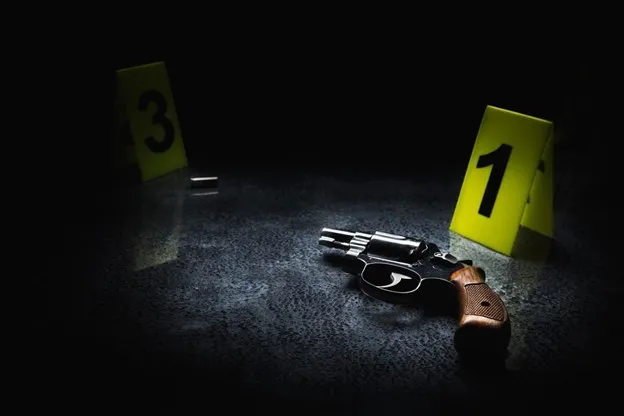Enhancing Denver Weapon Crime Enforcement

The city of Denver recognizes the importance of addressing weapon-related crimes and is committed to enhancing its enforcement efforts. Through a comprehensive approach, Denver aims to create a safer community by implementing strategies that prioritize community engagement, education, and collaboration with law enforcement agencies. By leveraging technology-driven solutions and intelligence-led policing strategies, Denver seeks to enhance its ability to prevent, detect, and investigate weapon-related offenses.
Furthermore, the city is investing in the training and resources of its officers to ensure they are well-equipped to handle these crimes effectively. In addition, Denver is actively exploring legislative and policy reforms that will further strengthen weapon crime enforcement. With these measures in place, Denver is determined to make significant progress in reducing weapon-related offenses and safeguarding its residents. The commitment to addressing weapon-related issues is reflected not only in the city’s investment in law enforcement but also in its ongoing efforts to enhance weapon crime laws.
Community Engagement and Education
Community involvement and education are pivotal in the prevention and resolution of weapon-related crimes in Denver. When law enforcement actively engages with the community to tackle these crimes, it fosters trust, gathers valuable information, and enhances overall safety for residents.
Community engagement initiatives, such as town hall meetings, neighborhood watch programs, and partnerships with local organizations, enable law enforcement to establish open lines of communication with residents, encouraging them to report suspicious activities or individuals.
Additionally, education programs are instrumental in providing community members with the essential knowledge and skills required to recognize potential threats, responsibly manage firearms, and advocate for safe gun ownership practices. These collaborative endeavors between community engagement and education empower individuals to actively engage in crime prevention, leading to a decrease in weapon-related offenses and nurturing a heightened sense of security within the Denver community.
Strengthening Law Enforcement Partnerships
Strengthening law enforcement partnerships is crucial for enhancing weapon crime enforcement in Denver. Collaboration between different agencies and departments can lead to more effective strategies and coordinated efforts to address the issue. Additionally, joint task forces can provide a platform for sharing resources, intelligence, and expertise, resulting in a more efficient and targeted approach. Building trust between the community and law enforcement is also essential, as it encourages cooperation, information sharing, and a sense of safety among residents.
Collaboration for Safer Streets
Law enforcement agencies are enhancing collaboration to ensure safer streets and combat weapon-related crimes in Denver. This collaborative effort involves multiple strategies aimed at strengthening law enforcement partnerships. Here are three key initiatives underway:
- Intelligence Sharing: Law enforcement agencies are actively sharing intelligence regarding weapon-related crimes, including information on suspects, firearms, and criminal networks. This exchange of information helps agencies to identify patterns, track down offenders, and intercept illegal weapons more effectively.
- Task Force Coordination: Joint task forces comprising officers from different agencies are being formed to target weapon-related crimes. These task forces bring together specialized expertise and resources, enabling a more coordinated and strategic approach to combating the problem. By pooling their knowledge and skills, law enforcement agencies can maximize their impact on reducing weapon-related crimes.
- Community Engagement: Law enforcement agencies are actively engaging with the community to foster trust and collaboration. By working together with community members, agencies can gather valuable information, receive support, and develop targeted strategies to address weapon-related crimes. This collaborative approach strengthens the overall response to such crimes and enhances community safety.
Joint Task Force Effectiveness
To optimize the effectiveness of joint task forces in Denver, law enforcement agencies are actively collaborating to strengthen their partnerships and combat weapon-related crimes. Recognizing the need for a coordinated approach, these agencies are working together to share information, resources, and expertise. By pooling their resources, law enforcement agencies can more effectively target individuals and groups involved in weapon-related crimes, leading to increased arrests and convictions.
One way in which law enforcement agencies are strengthening their partnerships is through regular communication and information sharing. Joint task forces are establishing protocols and systems to ensure the timely exchange of intelligence, enabling law enforcement officers to respond quickly and effectively to potential threats. Additionally, agencies are coordinating their efforts in conducting investigations and operations, leveraging their respective strengths to maximize results.
Furthermore, law enforcement agencies are collaborating on training initiatives to enhance their collective capabilities. By participating in joint training exercises, officers from different agencies can learn to work seamlessly together, improving coordination and communication during critical operations. This shared training also fosters a better understanding of each agency’s roles and responsibilities, facilitating smoother joint operations in the future.

Implementing Technology-Driven Solutions
The integration of technology has emerged as a crucial step forward for Denver’s weapon crime enforcement efforts. Implementing technology-driven solutions can significantly enhance the effectiveness and efficiency of law enforcement agencies in their fight against weapon-related offenses. One such solution is the use of gunshot detection systems, which can quickly identify the location of gunfire and alert authorities in real-time.
This technology not only helps in the rapid response to incidents but also aids in the collection of crucial evidence for investigations and prosecutions. Additionally, the deployment of surveillance cameras, both in public spaces and high-crime areas, can act as a deterrent and provide valuable footage for identifying suspects and establishing timelines of events.
Moreover, the adoption of advanced analytics and data management systems can assist law enforcement agencies in identifying patterns and trends related to weapon crimes, enabling proactive and targeted enforcement efforts. By harnessing the power of technology, Denver can bolster its weapon crime enforcement strategies and ensure the safety and security of its residents.
Intelligence-Led Policing Strategies
Integrating intelligence-led policing strategies is essential for enhancing Denver’s weapon crime enforcement efforts. By utilizing intelligence to drive operations and decision-making, law enforcement agencies can effectively target and disrupt criminal networks involved in weapon-related offenses. Here are three key components of intelligence-led policing strategies:
- Data Analysis: Collecting and analyzing relevant data can provide valuable insights into patterns, trends, and hotspots of weapon-related crimes. This information can be used to allocate resources strategically and identify high-risk areas for proactive policing.
- Information Sharing: Collaborating and sharing information with other law enforcement agencies, as well as community partners, can enhance the effectiveness and efficiency of investigations. Improved communication facilitates the identification of emerging threats and the development of targeted enforcement actions.
- Risk Assessment: Conducting comprehensive risk assessments helps prioritize investigative efforts and resource allocation. By identifying individuals or groups with a higher likelihood of engaging in weapon-related offenses, law enforcement can focus their attention on those who pose the greatest threat to public safety.
Integrating intelligence-led policing strategies empowers law enforcement agencies to proactively combat weapon-related crimes and ensure the safety of Denver’s residents.
Enhanced Training and Resources for Officers
Strengthening weapon crime enforcement in Denver involves a crucial initiative aimed at providing law enforcement officers with advanced training and resources. This effort is essential to equip officers with the requisite skills and knowledge for effectively handling and mitigating weapon-related crimes, encompassing matters concerning gun violence and the illegal possession of weapons.
Advanced training programs could focus on critical areas such as firearm safety, tactical response, and de-escalation techniques. Such training is vital in enabling officers to proficiently handle situations involving the carrying of firearms and to ensure the safety of both the public and themselves. This specialized training will also assist officers in accurately identifying and responding to incidents involving possession of weapons.
In addition to training, equipping officers with state-of-the-art equipment and technology is equally important. These resources can significantly enhance their capabilities in investigating and apprehending offenders involved in weapon-related crimes. This could range from improved protective gear to advanced investigative tools.
Furthermore, collaboration and input from police chiefs and other leaders in the criminal justice field can guide the development of these training programs and resource allocations, ensuring they are comprehensive and effective. By involving experts in the entire process, from training design to resource selection, law enforcement agencies can ensure that their officers are well-prepared to confront the challenges associated with weapon crimes.
Overall, by investing in enhanced training and resources for officers, Denver law enforcement agencies can strengthen their weapon crime enforcement efforts, contributing to greater community safety and more effective policing.
Legislation and Policy Reforms
To enhance weapon crime enforcement in Denver, it is essential to explore legislative and policy reforms. Strengthening gun control measures can contribute to reducing the accessibility of firearms to criminals. Implementing more rigorous background checks is another critical step, helping to prevent individuals with a history of violence or mental illness from acquiring weapons. Additionally, encouraging community engagement, such as reporting suspicious activities or participating in gun buyback programs, can foster a safer environment for all residents.
Strengthening Gun Control
To bolster gun control measures in Denver, a comprehensive approach is needed. The following steps can be taken to strengthen gun control legislation and policy reforms in the city:
- Implement stricter background checks: Strengthening the background check system can help prevent individuals with a history of violence or mental illness from obtaining firearms.
- Enforce mandatory reporting: Requiring gun owners to report lost or stolen firearms can help reduce illegal possession and trafficking of weapons.
- Promote safe storage practices: Encouraging responsible gun ownership through education and awareness campaigns can help prevent accidental shootings and unauthorized access to firearms.
Implementing Stricter Background Checks
One important step towards enhancing Denver’s weapon crime enforcement is by implementing stricter background checks, which can effectively prevent individuals with a history of violence or mental illness from obtaining firearms. Currently, background checks are conducted when purchasing firearms from licensed dealers, but there are loopholes that allow individuals to bypass these checks by acquiring firearms through private sales or at gun shows.
By closing these loopholes and requiring background checks for all firearm transfers, Denver can ensure that individuals who pose a threat to public safety do not have access to firearms. Additionally, implementing legislation and policy reforms that enhance the background check process, such as improving the accuracy and completeness of criminal and mental health records, can further strengthen Denver’s weapon crime enforcement efforts.
Conclusion
To effectively enhance weapon crime enforcement in Denver, the implementation of a variety of strategies is essential. These include increasing community engagement, which fosters trust and cooperation between residents and law enforcement, and strengthening partnerships among law enforcement agencies. The use of technology-driven solutions can also play a significant role in improving the efficiency and effectiveness of policing.
Intelligence-led policing strategies, which use data and analytics to predict and prevent weapon crimes, are increasingly important. Additionally, providing enhanced training and resources to officers enables them to handle incidents involving violent crime and dangerous weapons more effectively.
Legislative and policy reforms are also crucial in this effort. This could include the consideration of measures like extreme risk protection orders, which are designed to temporarily restrict access to firearms for individuals deemed to pose a significant risk to themselves or others. By focusing on these key areas, Denver can make significant strides towards creating a safer environment, reducing the incidence of weapon-related offenses, and effectively tackling the challenges associated with violent crime.
